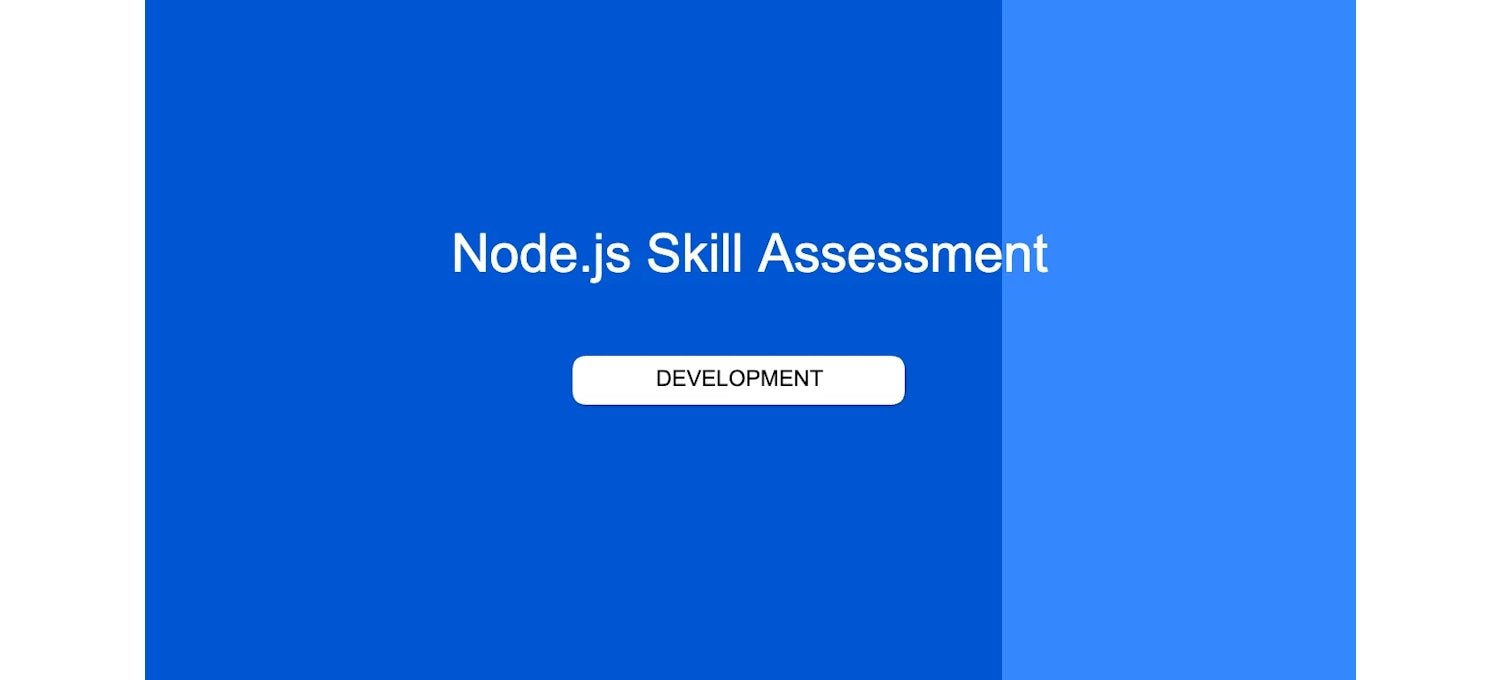Node.js Development Skill Assessment
Test your Node.js skills with this quick assessment. Answer 10 multiple-choice questions to get your score, then check the Scoring Guide to find your level and recommended learning path.

Node.js Programming Quiz
Node.js is a powerful, open-source, cross-platform runtime environment that allows developers to run JavaScript on the server side. Unlike traditional JavaScript that runs in the browser, Node.js enables backend development with JavaScript, making it easier for developers to use a single language for both front-end and back-end code. Its event-driven, non-blocking I/O model makes it highly efficient and suitable for building scalable, high-performance applications.
Node.js is particularly popular for real-time applications such as chat apps and online gaming, as well as for developing RESTful APIs and microservices. Its vast ecosystem of modules, available via the Node Package Manager (NPM), allows developers to easily add functionality to applications. With its speed, scalability, and versatility, Node.js is becoming an essential tool for modern web development.
Answer the following skill-based Node.js questions and click Submit to calculate your score. Use your score to find recommendations that align with your current skill level and explore career paths that interest you.
Test Structure
10 multiple-choice questions
Takes approximately 5-10 minutes
Immediate results with career recommendations
Custom learning paths based on results
1. What is the Event Loop in Node.js?
2. What's the difference between process.nextTick() and setImmediate()?
3. How do you handle errors in async/await?
async function getData() {
// What's the best practice?
}
4. What is middleware in Express.js?
5. What is the purpose of the cluster module?
6. What is the difference between exports and module.exports?
7. How do Streams work in Node.js?
8. What is the purpose of the Buffer class?
9. What's the difference between require and import?
10. What is the purpose of the worker_threads module?
Scoring Guide & Course Recommendations
Your quiz score above aligns with a general proficiency level of beginner, intermediate, or advanced. Match your score to the ranges below and explore the recommended course.
0-30: Beginner Level
Skill Level: New to Node.js
Recommended Coursera Courses:
Server-side Development with Node.js by NIIT
Node.js basics
Express.js fundamentals
Basic routing
40-70: Intermediate Level
Skill Level: Familiar with basics, ready for advanced concepts
Recommended Coursera Courses:
Master Express Framework: Beginner to Advanced with Node.js by Packt
Web server development
Integration with templating engines
Node.js & MongoDB: Developing Back-end Database Applications by IBM
Advanced node.js and express techniques
Integration with MongoDB
Server Side JavaScript with Node.js by NIIT
Asynchronous programming
Working with the file system
80-100: Advanced Level
Skill Level: Experienced Node.js developer
Recommended Coursera Courses:
Node.js Unleashed: Mastering Backend Developmentby Educba
Advanced Asynchronous programming
Building real-time applications
RESTful Microservices Using Node.js and Express by NIIT
Building and documenting REST APIs
Implementing microservices architecture
Skills Covered by Level
As you progress in your Node.js career, different levels have different skills, and here are some common ones.
Beginner Level
Node.js basics
NPM basics
Asynchronous programming
Basic Express.js
File system operations
Basic error handling
Intermediate Level
Express.js middleware
Authentication
Database integration
RESTful APIs
Testing
Performance basics
Advanced Level
Microservices
Real-time applications
Performance optimization
Security
DevOps integration
Architecture patterns
Career Paths
Your Node.js programming career path will be unique to your strengths and interests. Below are some common roles at different skill levels. Explore our Web Development Career: Decision Tree to understand better how your Node.js programming skills can take your career in an exciting direction.
Beginner Level: Junior Node.js Developer, Backend Developer Trainee, Full Stack Developer Intern
Intermediate Level: Node.js Developer, Backend Developer, Full Stack Developer
Advanced Level: Senior Node.js Developer, Backend Architect, Technical Lead
Key Technologies to Learn
Some key technologies to focus on while pursuing your career in Node.js programming are below:
Node.js
Express.js
MongoDB/PostgreSQL
Redis
Docker
REST/GraphQL
Node.js is a valuable addition to a developer's skill set. This versatile technology is commonly used in various software development and web development careers. Develop back-end apps using Node.js as part of the beginner-level IBM Full Stack Software Developer Professional Certificate on Coursera.
Coursera
Writer
Coursera is the global online learning platform that offers anyone, anywhere access to online course...
This content has been made available for informational purposes only. Learners are advised to conduct additional research to ensure that courses and other credentials pursued meet their personal, professional, and financial goals.